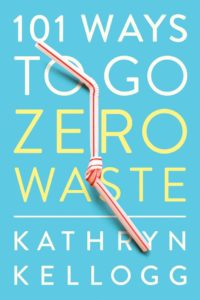Sustainability Book Review: Working Harder to Reduce Waste and Plastic Use
Apr 25, 2022
Over a decade ago, I noticed a forlorn cornfield next to a big-box store. There were hundreds of plastic shopping bags in the field, caught on the previous summer’s corn stubble. I resolved to sew durable, cloth bags for the three households in our family. We’re still using the same cloth bags, which have been used to carry groceries and goods on three continents. I estimate the number of plastic and paper shopping bags we haven’t used to be at least 10 per week, or 520 per year, and 5,200 in a decade. Our steel coffee mugs saved a similar quantity of disposable carry-out cups. I bet most families reading this have a story very like ours.
While this is a great track record, reading Kathryn Kellogg’s book “101 Ways to Go Zero Waste” convinced me that we still have a long way to go. Her book covers nearly all aspects of household practices and lifestyle choices to reduce waste, especially plastic and styrofoam. She shares alarming statistics about the distribution of waste plastic in our water and terrestrial environments, along with quotes that hit close to home like “Every plastic toothbrush ever created still exists. Yes, all of the toothbrushes you ever used are still out there….” Another concept she shared is that even when we work hard to avoid buying extra packaging, we don’t see the huge amount of boxes and other containers (possibly shrink-wrapped in plastic) that are used to ship bulk quantities of products to stores.
Every page of the book describes one more of her 101 ways to avoid buying and using non-sustainable products and packaging. Her goal isn’t necessarily for us to recycle more (although recycling will always be important) but rather to buy less material needing recycling or landfilling in the first place. Some of the practices to avoid meat packaging, for example, may be difficult in our rural areas. Also, the book was published in 2019 before the pandemic, so taking our own glass food containers to a store or restaurant may no longer be an accepted practice for health reasons.
Nevertheless, the book is a wonderful reference on simple options and changes in our daily lives and practices that together can make a big difference. The book and its audio version may be available through local libraries or inter-library loan. Kellogg also shares more recent research and advice at her website, https://www.goingzerowaste.com.
Kathy Bartilson is a member of the Wisconsin Conference Creation Care Team. Reprinted courtesy of the North Woods and Waters of the St. Croix Heritage Area Newsletter, Spring 2022
‹ Back to News & Updates




Sign up for our newsletter!
Find us on
Contact Us